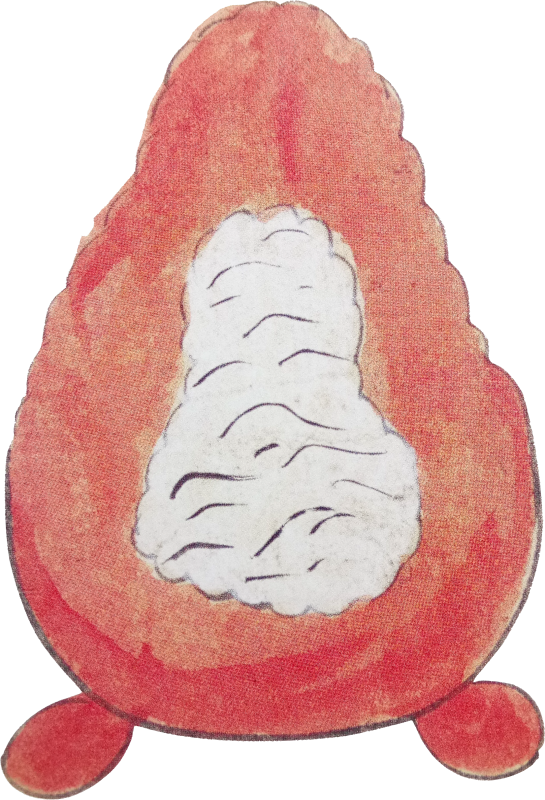
DAY TWENTY EIGHT: SHICHUU
("Death Bug")
Written by Jonathan Wojcik, Researched and Translated by Rev Storm
Design Review:
This is the last of the blob-like or cyst-like mushi we're reviewing, and it's overall one of my favorite designs in the whole book. The more insect-like and monster-like bugs are cool, don't get me wrong, but there's just something special about this goofy little meat-pear and its little penguin footsies, not to mention the fact that it just "sometimes remembers" it can move around. That's hilarious!Visually, this mushi is suspiciously similar in structure and appearance to a colorectal polyp, but its description says it causes tuberculosis. Perhaps that's just another coincidence, but perhaps someone, the author or otherwise, came to theorize that there was a connection between these two deadly conditions? In any case, the dopey, faceless pear is very intriguing as a manifestation of a bacterial infection, which brings us to...
TODAY'S REAL WORLD PARASITE:
Mycobacterium tuberculosis

Amazing that we haven't discussed bacteria here yet, isn't it? They probably comprise the largest total living biomass on our whole planet, and the power they exert over all other life cannot possibly be overstated. In your body alone, bacterial cells can rival the total number of your own cells and your mutual symbiosis with many of them is integral enough to your metabolism that we may as well consider bacteria to be another human "body organ." Bacteria build the sediment of the deep ocean, they facilitate the decomposition of all dead biomass, they are the only means by which entire food chains can convert certain key nutrients into anything that a plant or animal can process and bacteria in the upper atmosphere even seem to manipulate the weather.
But with so many, many strains of bacteria in so many, many numbers around the world, it's inevitable that many of them play less nice with us multicellular lifeforms. In fact, even our beneficial bacterial friends can sometimes make us ill; the dreaded MRSA or "staph" is a bacterium already found by the billions on your skin and hair, but sometimes finds a nutritious feast in an open wound and flares up into a "flesh eating" infection. Likewise, the hated E. Coli is a natural denizen of your intestines, but a foreign strain can trigger a severe immune response, and that's actually because your own resident strain basically told your immune system not to let those other guys in. Some bacterial infections are simply an over-abundance of any bacterial species at all, and what makes you so sick isn't always the organisms themselves, but the toxins released when they begin to die.
Some bacteria, however, are much more nefarious. Some are obligatory pathogens, meaning that they live primarily in a hostile relationship with a host organism. This is by definition what we usually consider a parasite, but for reasons too ill-defined to even explain here, the term "parasite" is never officially applied to bacterial infection of multicellular lifeforms regardless of whether the bacterium in question can survive by any other means.
Mycobacterium tuberculosis is, and is thought to have always been, the single deadliest bacterial infection known to humankind. It was once known as the "White Plague" in contrast to the "Black Death," and even now infects up to ten million people per year with one to two million fatalities world-wide.
"TB" is an aerobic bacterium, meaning that it requires air to live, whereas most bacteria that inhabit our bodies are anaerobic, and as such it can survive quite happily in the respiratory tracts. Due to their constant exposure to the outside environment, the sponge-like inner lining of our lungs is more fiercely protected than almost any other tissue in our body, but this is just what TB is counting on. When engulfed by a white blood cell, or macrophage, M. tuberculosis covers itself in an antacid compound we all 1-tuberculosinyladenosine, or 1-TbAd, which neutralizes the molecular processes by which the macrophage would normally break down the bacterial wall and digest the intruder.
Having given your little policemen indigestion, tuberculosis gains free access to the nutrient stores within them, and freely multiplies until the macrophage is destroyed from within. This organism can literally feed on the single most important thing your body evolved to keep bacterial growth well-regulated, and so it's no surprise that the use of outside antibiotics is often the difference between life and death. As the infection continues, the lungs produce excess mucus in an attempt to trap and flush out the invaders, while the tissues continue to swell and secrete histamines that allow more and more macrophages to flood the lungs. All of this is a miserable enough experience for the patient, but in case you weren't aware of this, dead macrophages happen to be the primary component of what we call pus.
The most frightening part of tuberculosis, and perhaps another reason it isn't usually referred to as a "parasite," is that many of you already have it as we speak...it just doesn't always grow so out of control. Sometimes, your TB population is still kept small enough by your body's other defenses and even competition with other bacteria that you may live your entire life without suffering the symptoms, but not everyone is going to be so lucky. Sometimes all it takes is a single bacterium coughed up out of your lungs to pass it on to someone else, and that is yet another reason why if I see you sneezing and coughing in public and you don't even make the slightest effort to cover your mouth I will not hesitate to shame you in an internet article about imaginary bugs, yes, you, middle-aged white suburban parent standing behind me in line at the Dollar Tree on precisely 10/17/2019. Your kids might not know better, but you've had at least forty or fifty years to learn not to be a putrid phlegm cannon.
NAVIGATION:





































































